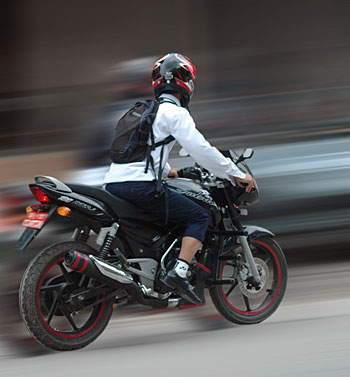 KIRAN PANDAY |
Whenever I see a reckless young motorcyclist swerving hell-for-leather through traffic, helmet askew, my first reaction is an impotent rage that finds outlet in imagining him smashing into a wall. Feeling (ever so slightly) guilty, I then wonder how it is that the youth in question does not realise how stupidly dangerous his actions are, not only for himself but also for everyone else on (and off) the road. I feel old even as I condemn him for being so young at mind, and right about this moment it occurs to me that I have turned into my parents.
Before Dasain, in the course of travels in Humla's Limi Valley, we were expected to take a detour to ease the crossing of the Ling-Chu River. One of the younger members of the group (myself not included) asked the guide if it was not possible to cross 'right here' and save over an hour of walking. There was a brief discussion, and we agreed that it made sense to cross later. The group moved on, but our young friend (all of 25) stopped suddenly, and asked me (36) and another (27) if we shouldn't just go for it anyhow.
We agreed. And though the crossing through the marrow-chilling cold of the three-pronged, fast-flowing Ling-Chu wasn't exactly life-threatening, there was the strong possibility of a good pneumoniac soak a shiver below 4,000 metres. We made it without too much incident. An hour later, we had to cross again to make the camping site. This time, the river was too wild (and our memory of the waters too chilly) to persuade us to wade over. The only option was a stone bridge missing the bridge, that is, four columns left standing in the river.
Once again, the youngest among us led us leaping across the five-foot gaps. Safely over, it occurred to me very definitely, "Am I not too old to be doing something like this?" Certainly I would not have, had it not been for my younger companions. But immediately after, I recalled that time in Australia fifteen years ago when we'd fearlessly jumped from one 10-foot boulder to another along the length of a beach to escape the incoming tide. I hadn't hesitated then; it was risky, sure, but fun.
Of course death seems such an unlikely prospect to the young. Thrill-seeking often outweighs good sense. But when does fear begin to tip the balance, recalibrating the unnecessary risks we are willing to take in the course of the everyday?
Clearly this depends on the individual. I have middle-aged friends who drive as badly as the aforementioned teenage louts. Family responsibilities have not attenuated their risk-taking behaviour, though they are more likely to risk life and limb when they are drunk. For the main, even these individuals have a larger sense of their own mortality, stemming as much from a knowledge of the diminished time remaining to them as the very personal experience of having witnessed death. As your youthful aspirations fade, or are modulated into what is acceptable, you also begin to love life for all it is, whether you admit it or not. You are unwilling to let go, and learn not to risk life for fleeting pleasures.
It's ironic that those who have the most to look forward to, whose aspirations are as yet unclouded by the disillusion of ordinary life, are so careless about their own lives. Perhaps the moodiness of adolescence, when every problem seems monolithic, conspires with the spirit of rebellion to inspire this thoughtlessness. Oh, to be young again? Once was enough. I'm glad I survived, and good luck to you, boys and girls. Just remember there's nothing beyond that wall, if you do crash into it.
READ ALSO:
Crossing the Larkya La, SAM COWAN



